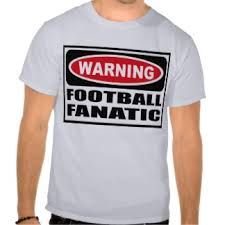Addiction
Fanorexia
Can supporting your favourite soccer team be an addiction?
Posted April 14, 2014
Why are we so loyal to our national and club soccer teams? Whatever the results, we tend to support them week in week out all year round. They can cause us misery and heartache and yet still we support them. Could it be that following our clubs is an addiction? It has been argued by academics working in the marketing field that commercial organizations would love to have the kind of brand loyalty shown by soccer fans – something that Ken Parker and Trish Stuart argued in their 1997 award winning paper ‘The ‘West Ham Syndrome’ published in the Journal of the Market Research Society (I’m not making this up, honest!).

Parker and Stuart, working at the time of the study for the company Discovery Research, surveyed 2000 adults and also carried out some focus group interviews with British soccer fans (including some ardent West Ham United supporters). They found that 58% of males had made a commitment to club their team by the age of 11 years More than half of children whose parents supported a team went on to support the same one, while a third of all fans still followed their local team.
Marketeers would love to be able to take the seemingly unstinted loyalty of soccer fans and somehow transfer that loyalty to the products they are trying to sell. For instance, the brand of coffee we buy tends to governed by many factors such as television advertising, the taste, the price, the packaging, etc. If we come across coffee that (for whatever reason) is better (cheaper, tastes better, etc.), we automatically switch our ‘allegiance’ to another brand of coffee. Parker and Stuart argued that wherever West Ham finish in the league, Hammers fans would not desert their club and/or switch to another club. So what’s the difference between soccer clubs as a brand and other commercial products as a brand? Maybe it’s passion and the fact that soccer can be such an emotional experience for the diehard fan.

Some working in the advertising industry claim many people working in marketing lack passion in their product. Apparently there are other products (such as cars) that consumers get very passionate about that means they repeatedly buy a particular make of car despite any acknowledged faults. However, one huge fault can damage a brand’s reputation almost overnight, as car manufacturer Toyota is only too aware. The good news for Toyota is that one of the most interesting things about research on the ‘West Ham Syndrome’ is that it can help to explain why leading brands are able to bounce back from PR disasters in similar ways to soccer clubs come back from being relegated to a lower division.
However, are soccer fans really as loyal as most of us assume? A paper by Alan Tapp at the University of the West of England examined the loyalty of soccer fans (Journal of Database Marketing and Customer Strategy Management, 2004) and wondered what it is about soccer clubs as a brand that makes them so successful – especially as the ‘product’ is so inconsistent and unpredictable? Parker and Stuart claimed that levels of loyalty were “only marginally affected” by West Ham’s fortunes. However, Alan Tapp says this is completely untrue. He cites analysis of soccer attendance figures since 1945 to show that crowd sizes are related to a team’s position in the league, and that teams lose support when they are doing poorly. Despite the fact that crowd attendance is linked to how well a soccer club is doing, it’s still probably true to say that soccer fans are still more loyal to their club than they are to most other products.

Just before the 1998 soccer World Cup, I began to carry out some research into soccer fanaticism and whether soccer fanatics could be considered ‘addicted’ to following their soccer team. This is easier said than done as it all depends upon how addiction is defined, and if ‘soccer fan addiction’ exists, what are people actually addicted to? If you are a regular reader of this blog, you will be aware that I define addiction as any behaviour that features what I believe to be the six core components of addiction (i.e., salience, mood modification, tolerance, withdrawal symptoms, conflict and relapse). Throughout my career, I have consistently argued that any behaviour that fulfils these six criteria should be considered as a genuine addiction. If you were addicted to following your soccer team, this is what I would expect:
Salience - This occurs when following your soccer team (and doing things related to your soccer team) becomes the most important activity in your life and dominates your thinking (total preoccupation), feelings (cravings) and behaviour (deterioration of socialized behaviour). For instance, even if you are not actually engaged in something soccer-related, you will be thinking about the next time that you are.
Mood modification - This is the subjective experience that you would feel as a consequence of following your soccer team (i.e., you experience an arousing ‘buzz’ or a ‘high’ – or the exact opposite – a tranquilizing feeling of ‘escape’ or ‘numbing’ when following your team).
Tolerance - This is the process whereby increasing amounts of activity related to your soccer team are needed to get mood modifying effects. This basically means that if you were engaged in activities related to following your soccer team, you would gradually build up the amount of the time you spend engaged in those activities.
Withdrawal symptoms - These are the unpleasant feeling states and/or physical effects (e.g., the shakes, moodiness, irritability etc.) that occur when you are prevented from following your soccer team or stopped from engaging in soccer-related activities.
Conflict - This refers to the conflicts between following your soccer team and those around you (interpersonal conflict), conflicts with other activities (your job, schoolwork, social life, hobbies and interests) or from within yourself (knowing you are doing too much of the activity and/or subjective feelings of loss of control) which are concerned with spending too much time following your soccer team.
Relapse - This is the tendency to revert back to earlier patterns of behaviour (following your soccer team and engaging in soccer-related activity) after a period of abstinence.

Using these criteria, I have come across very few genuine examples of someone addicted to a soccer team. The most extreme case I have come across was one woman who left her husband because of his ‘addiction’ to Chelsea soccer club. She told me that their bedroom was a shrine to Chelsea, he watched almost every Chelsea game home and away (including European away matches), spent all their joint savings and ran up huge debts following Chelsea, and eventually got sacked from his job because he kept ringing in sick whenever Chelsea were playing hundreds of miles from home during midweek games. Out of season he would be constantly depressed and would try to alleviate his mood by endlessly watching videos of Chelsea’s greatest games. Once the soccer season started, his depression would lift. I never met this individual but he appears to have fulfilled my criteria for addiction.
For most people, enthusiastically following your team – even to excess – is unlikely to be an addiction. The main difference between a healthy excessive enthusiasm and an addiction is that healthy enthusiasms add to life and addictions take away from it.
References and further reading
Parker, K., Stuart, T. 1997. The West Ham syndrome. Journal of the Market Research Society 39 (3), 509-517.
Tapp, A. (2004). The loyalty of football fans – We'll support you evermore? Journal of Database Marketing and Customer Strategy Management, 11, 203-215.




